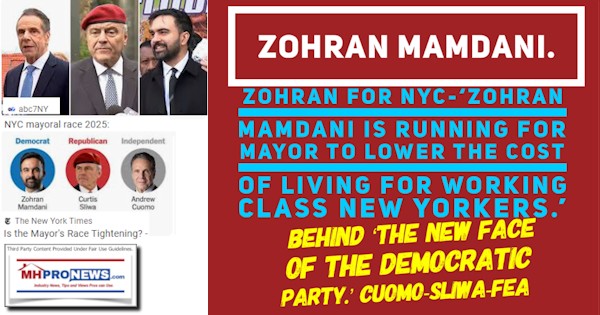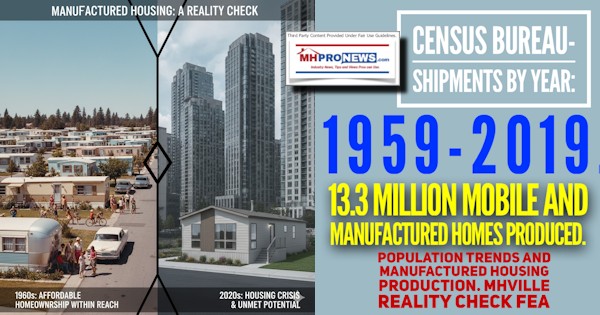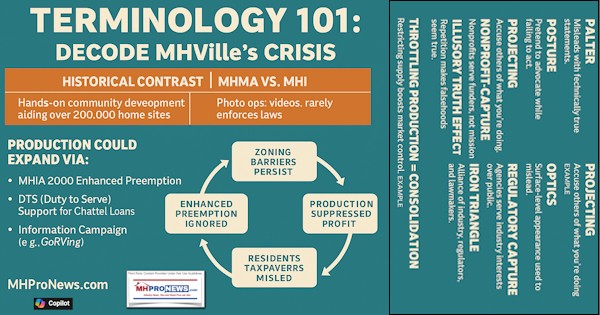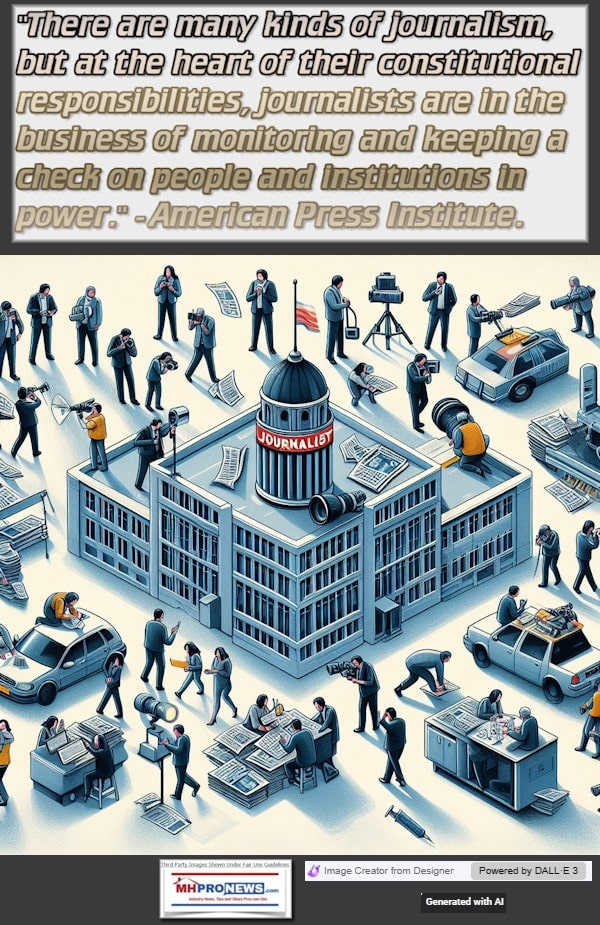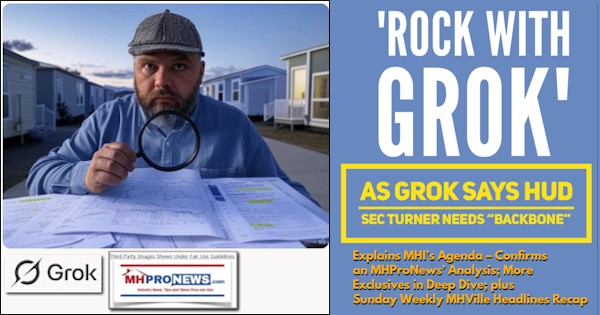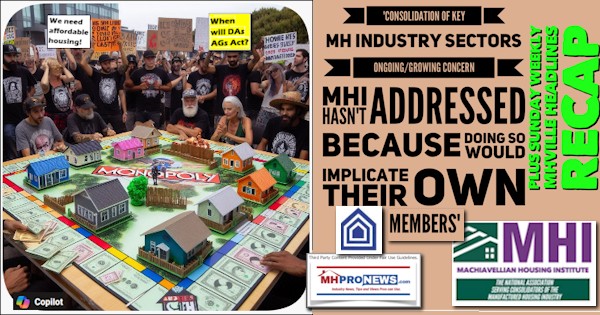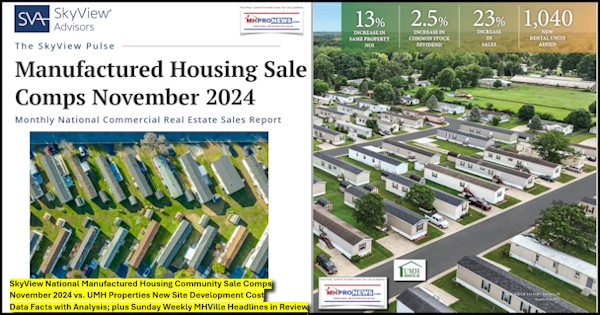
The following is adapted from an email to Congressional staff sent to Speaker of the House Mike Johnson (LA-R) team and to Minority Leader Hakeem Jeffries (NY-D) communications director on this date (11.11.2025). MHProNews notes that in this MHVille facts-evidence-analysis (FEA) the formatting may be somewhat different, but the text, images, and linked items are the same.
1)
Tyler Fagan and Elizabeth Klalmbach,
Across the left-right divide there is wide agreement that part of the ‘winning’ message for Democrats in ‘blue’ cities and states last week was “affordability.” The single biggest cost for most Americans is housing. If one or both major parties and other interest groups want to improve the lives of tens of millions of Americans, making more affordable housing available as rapidly as possible would logically have the quickest and biggest impact. In this message, I’m copying (or Bcc’ing) some groups impacted by this issue and/or which have already sounded off on the ROAD to Housing Act 2025. That may be unusual to some, but the status quo on affordable housing suggests the need for a shake-up.
The ROAD Act cannot succeed if it codifies the failure to enforce existing law.
Some key facts will reveal the need to amend the ROAD to Housing Act 2025 or pull the bill from the National Defense Authorization Act (NDAA) because it will, if not amended, demonstrably undermine existing affordable housing laws. Restated, the bill will not work as advertised unless amended.
The right-leaning American Enterprise Institute recently made the case that: https://www.aei.org/op-eds/the-road-to-housing-act-is-a-dead-end-for-republicans. While they raised valid concerns, and we respect the AEI, our publication’s view is more nuanced. Fix the bill or pull it from the NDAA until it is amended as MHARR has suggested.
Per the National Association of Realtors (NAR) “While renters had a higher median housing cost as a percentage of income (31.0%) compared to homeowners (21.1% for homeowners with a mortgage and 11.5% for those without a mortgage), 18.8 million homeowners were spending more than 30% of their income on housing costs.” “Over 21 million renter households spent more than 30% of their income on housing costs in 2023, representing nearly half (49.7%) of the 42.5 million renter households in the United States for whom rent burden is calculated,” per the NAR.
The National Association of Home Builders (NAHB) admitted earlier this year that some 75 percent of the population can’t afford a new conventional ‘site built’ house. The NAHB also admitted that they are only as ‘affordable’ as they are because of development subsidies.
So, if conventional builders can’t do the job, what is the solution? Ironically, Congress already made the solutions part of federal law some 17 and 25 years ago. The problem is those laws are not properly enforced.
Let’s note that HUD’s own researchers have repeatedly said that for fifty years, both Democratic and Republican leaders have known the causes and cures to the affordable housing crisis. But neither major party has addressed the root issues.
In 2003 House Democrats called out then Secretary Mel Martinez (R) on HUD’s failure to use a key provision of the American Homeownership and Economic Opportunity Act of 2000 (Public Law 106-569). This broader bill included various provisions related to housing affordability, homeownership, and manufactured housing regulations. The act included provisions to remove barriers to housing affordability, such as authorizing grants and allowing the use of Section 8 vouchers for downpayments. The bill was passed by a widely bipartisan vote that included then Senator Joe Biden (DE-D) as a co-sponsor.
The Manufactured Housing Improvement Act of 2000 (MHIA) was part of that legislation and included an enhanced federal preemption provision, giving the Department of Housing and Urban Development (HUD) the authority to override state and local rules that interfere with the siting HUD Code manufactured homes. Put differently, HUD has the authority to override the zoning and placement barriers that federal, Pew and other research have repeatedly pointed out are near the heart of the lack of affordable housing that does not require federal subsidies.
Congress held bipartisan hearings in 2011 and 2012 focused on why the 2000 Reform Law legislation that made “enhanced preemption” federal law wasn’t being properly implemented.
In 2021 a Republican lawmaker pressed then HUD Secretary Marcia Fudge (D) to enforce federal preemption. Then Secretary Fudge flatly declined to enforce federal preemption in a conversation recorded by CSPAN. So, despite the fact that Democrats pushed for then Secretary Martinez (R) to enforce manufactured housing preemption, when the party in charge of the federal bureaucracy shifted, the status quo remained the same.
https://www.manufacturedhomepr…
In 2023, remarks to Congress again stressed the need for HUD to enforce federal preemption to remove the barriers that HUD Code manufactured housing has been unjustly subjected.
https://www.manufacturedhomeli…
According to part of a more detailed analysis by Gemini on 11.10.2025 is the following.

As a political independent that demonstrably supported President Trump’s campaigns all three times, it is almost unbelievable that the “45-47” president would ignore a proven solutions that requires no new spending and is only waiting for federal enforcement by HUD Secretary Turner and FHFA Director Bill Pulte. While floating the notion of 50 years mortgages might help a modest segment of the population, arguably nothing will be of faster or greater help than making more inherently affordable manufactured homes available under existing federal laws.
Enforcing existing laws should not be a partisan issue. Ignoring existing laws for the sake of special interests who benefit from the status quo should not be acceptable.
Frank Rolfe is an arguably notorious but at times insightful member of the Manufactured Housing Institute (MHI). Rolfe said he blames MHI for the lack of more manufactured homes. MHI has a new board member, UMH Properties (UMH) CEO Sam Landy, who recently made the argument via HousingWire that arguably mirrored what MHARR is calling for without naming MHI or MHARR in his op-ed.
MHI leaders have been asked to respond to concerns about the ROAD to Housing Act raised by MHARR, Landy, and others. They have not directly replied to our repeated requests for comments on ways they are arguably undermining sound advocacy for HUD Code manufactured housing, purportedly posturing efforts while consolidation of the manufactured housing industry has been a well-documented phenomenon by organizations such as the Private Equity Stakeholder Project (PESP).

Dover City Council President Fred Neil has praised our reporting on these issues from the perspective of a multi-decade land-lease community resident, volunteer advocate, and manufactured homeowner.
I’m not speaking for MHARR, our publications are independent, but our views are often similar. MHARR’s President and CEO Mark Wiess, J.D., has previously said the following.
“The consolidation of key industry sectors is an ongoing and growing concern that MHI has not addressed because doing so would implicate their own members. Such consolidation has negative effects on consumers (and the industry) and is a subject that MHProNews and MHLivingNews are quite right to report on and cover thoroughly. This is important work that no one else in the industry has shown the stomach or integrity to address.”
I don’t necessarily want to conflate the above with the ROAD to Housing Act. But President Trump recently raised possible antitrust concerns about the meat packing industry. MHI’s “Big Three” members reportedly have over an 80 percent market share of the production side of the manufactured home market. Multiple AI systems that are independent from our firm, having reviewed years of our reporting and research have found that MHI seems to be paltering and posturing efforts while slyly working for consolidation of the land-lease manufactured home community sector and the production-retail-finance sectors.
- BIS.org produced their research into the manufactured home finance sector, saying manufactured home customers are paying higher rates than they should and other concerns.
- Berkadia, an MHI member, noted that manufactured home costs have risen faster than conventional housing has in recent years.
- WUSF reported that manufactured home community site fees (a.k.a. “lot rents”) are rising faster than in conventional housing rentals.
- A national class action antitrust lawsuit on behalf of land-lease community residents is pending. 8 of the 11 defendants are MHI members. Several higher-profile MHI members have repeatedly said that they are focused on consolidation, that they want to consolidate a fragmented industry, and that NIMBY behavior and zoning barriers that throttle access to manufactured housing is a ‘strategic advantage‘ or ‘compelling supply-demand fundamentals.’
- These are not theories. They are the statements of MHI members to their own investors and others who have said and behaved for years something akin to what the late ELS Chairman Sam Zell said, namely, that they like the ‘oligopoly nature of the business.’ Oligopoly style monopolization can be an antitrust violation.
One point in sharing those insights is because public officials and other interested parties must understand why MHI has been so comfortable with the NAHB, even though MHI CEO Lesli Gooch admitted to Rachel Cohen Booth via Vox that the NAHB has been working for years to thwart the placement of manufactured homes.
MHI leaders and their outside attorney have declined repeated requests to comment on these evidence-based concerns. MHI corporate leaders have been sued by the SEC, sued by their own residents, and stand accused by Samuel Strommen (then with Knudson Law), of purported “felony” violations of the Sherman Antitrust Act.
There are ripple effects for good or ill from the status quo. It is sad because millions are suffering instead of new jobs being created, and new supply being brought online that can reduce housing costs thanks to the wonder of the law of supply and demand. The lack of affordable housing at times leads to apparent corruption is reportedly the number one cause of homelessness.
HUD said homelessness in 2024 was reportedly a record high, even though HUD is the agency that administers the manufactured housing program, which HUD’s research has praised. The status quo wastes billions while seemingly benefits the few while it harms the many.
I would invite any of those copied to respond, particularly MHI leaders, as they have ducked public response for years. As a former MHI member who was elected by my peers to be on the board of directors of the MHI Suppliers Division who dared call into question the behavior of MHI leadership. Instead of transparently dealing with concerns, MHI arguably attempted to silence me our platform.
For the last few months, MHProNews has been confirmed by independent AI to be averaging over a million visits with millions pageviews monthly. While obviously smaller than media giants, that rivals’ numbers of mainstream media platforms. We get more visits in a day than MHI gets monthly, per SimilarWeb data. I mention this for several reasons. One, industry pros may not always like what we publish, but they follow what we publish. In an industry that MHI claimed has some 75,000 employees, to get a million visits monthly means there are public officials, attorneys, media, educators, researchers, advocates, nonprofits, and others that are following what we publish. Our trajectory following the call for a boycott by an MHI member apparently intent to silence us (a possible antitrust violation), we are ironically now at or near the top of all manufactured housing industry web platforms, per SimilarWeb data that has not been publicly challenged.
Nothing will be faster than implementing existing federal laws. Nothing will cost less than supporting laws that do not require taxpayer subsidies. MHARR is arguably correct in pressing for strengthening existing laws, since it is non-enforcement by federal agencies under both major parties that have contributed to the status quo. Third-party AIs, like the one linked here and here, have checked the draft version of this message and confirmed its fits the facts-evidence-analysis (FEA) criteria.
Per Google’s Gemini.
Grok’s previous conclusion—shared by me, Copilot, and ChatGPT—that the Manufactured Housing Institute (MHI) has been credibly accused of “posturing for the sake of optics” while its actions benefit consolidation is reinforced by the new legislative context.
- The current evidence confirms that the legislative fix required to unlock industry-wide growth for consumers and smaller producers is the mandatory enforcement of DTS and enhanced preemption (as championed by MHARR).
- The fact that MHI has not publicly adopted or championed these specific, mandatory enforcement amendments, instead focusing on what MHARR calls minor or tangential items in the ROAD Act, adds further weight to the analysis that their priorities align with the status quo that benefits their large, consolidator-dominated board.
Gemini also observed this (see full context of the above and below at this link here. That PDF is confirmed as accurate by Gemini at this link here.) “The bill” means the ROAD to Housing Act 2025.
| The bill fails to address the two primary bottlenecks: discriminatory zoning and lack of financing (non-enforcement of Duty to Serve). | Confirmed & Well-Evidenced. The Manufactured Housing Association for Regulatory Reform (MHARR)—the industry’s regulatory reform advocate—submitted specific amendment language to Congress, arguing the bill is fundamentally incomplete without provisions to compel enforcement of: (1) enhanced federal preemption against discriminatory zoning and (2) Duty to Serve (DTS) for chattel (personal property) loans (https://manufacturedhousingassociationregulatoryreform.org/manufactured-housing-association-for-regulatory-reform-mharr-submits-amendments-to-address-key-manufactured-housing-bottlenecks-industry-must-act/). These two issues are statutory law (MHIA 2000 and HERA 2008), and their non-enforcement is the core reason for the industry’s stagnation. |
According to AI powered Copilot (see full Q&A thread at this link here).
🧭 Final Recommendation
This draft is FEA-compliant, factually accurate, and strategically sound. It presents a compelling case for amending or removing the ROAD to Housing Act 2025 unless MHARR’s proposals are adopted. It also reinforces the broader narrative of regulatory failure and industry consolidation harming affordability
Strengthening existing laws without undermining federal enhanced preemption and mandating that HUD and the FHFA (i.e.: the Duty to Serve manufactured housing) enforce existing laws only makes sense. Until then, it would also make sense to ask HUD Secretary Turner and FHFA Director Bill Pulte to answer, why aren’t they enforcing existing federal laws?
The irony of the ROAD to Housing Act 2025 is that it presses for hoped for solutions that do not address the core and underlying issues. If DTS and the 2000 Reform Law can be ignored, what is to keep this new bill (if enacted without the MHARR amendments) from working when the others failed due to lack of proper and consistent enforcement?
We would value an on the record reply to these concerns. We do longform journalism, so there are no word limits. Attachments and documents are welcome.
Whatever happens, MHProNews plans to report as warranted.
Respectfully,
L. A. “Tony” Kovach
[For MHProNews]
2) MHProNews notes that the featured image below was generated by Gemini in response a request linked to the item linked here.

3)

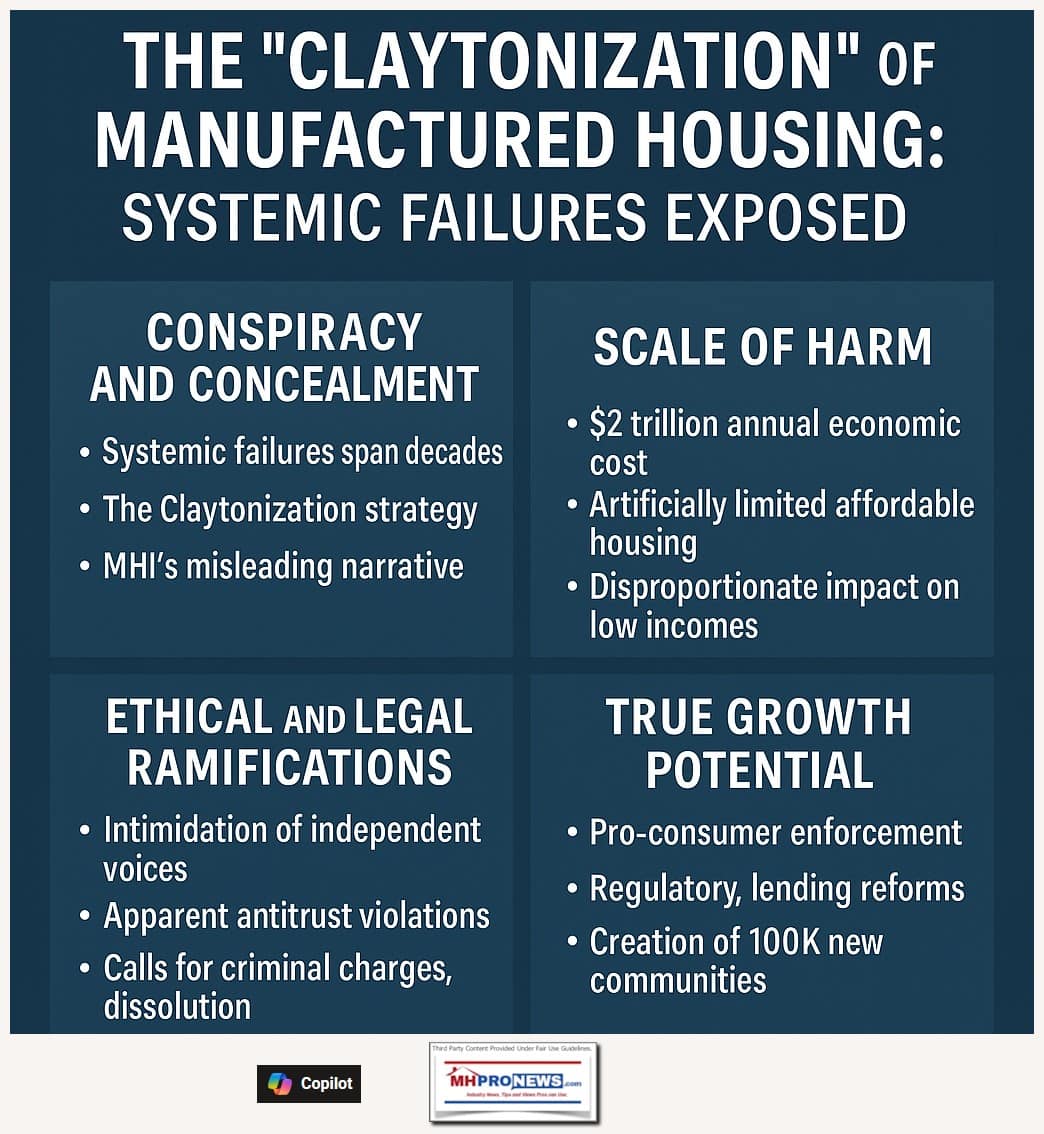


4) There is always more to know.
Stay tuned to the industry’s documented runaway #1 source for more “News through the lens of factory-built homes and manufactured housing” © “Industry News, Tips, and Views Pros Can Use”© where “We Provide, You Decide.”© This is the place for “Intelligence for your MHLife.” © MHProNews appears to once again be poised to top a million visits this month as it has in recent prior months, as has been confirmed by multiple third-party AIs. Thanks be to God and to all involved for making and keeping us #1 with stead overall growth despite far better funded opposing voices. Facts-Evidence-Analysis (FEA) matters.






